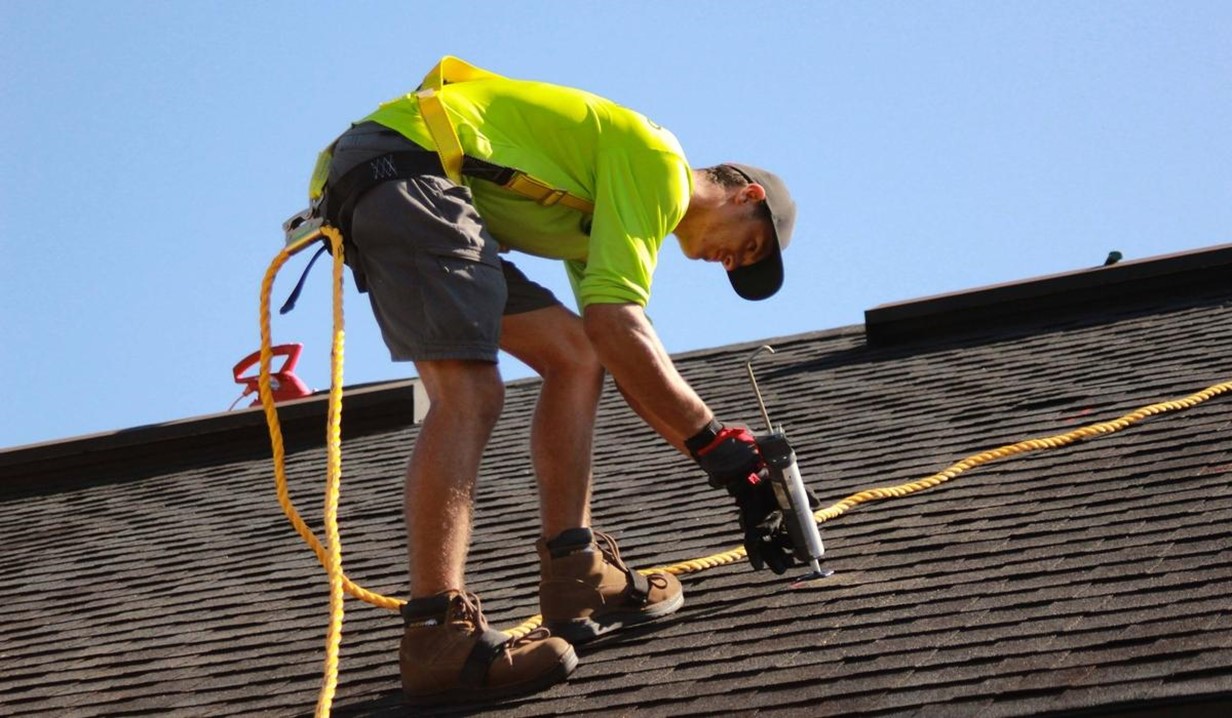How To Become A Roofing Contractor – A Guide To All The Qualifications & Skills You Need!

Becoming a roofer can be challenging. You’ll have to deal with heights, work in crazy weather conditions, and move heavy materials, but hey, it’s also a rewarding career path.
The pay doesn’t stink (more on that below), it provides the opportunity to work outdoors, and it’s incredibly fulfilling if you love solving hands-on complex problems.
As a seasoned roofing contractor, I know that this profession requires a combination of technical skills, physical stamina, and business acumen. If you’re interested in pursuing a career in roofing, then this article is for you.
Here, I will walk you through the skills and qualifications needed to become a roofing contractor. Let’s get started!
What do you need to become a roofer
Meet minimum education requirements
To become a roofing contractor, you’ll at least need to have some basic educational qualifications. This includes having a high school diploma or GED. This is because many employers value roofers who can read, draw, and handle basic mathematics.
High school courses that can give you an edge for a career in roofing include basic math and mechanical drawing.
Complete an apprenticeship
You can learn the skills needed to be a roofer either through on-the-job training or by completing an apprenticeship. While most roofers learn on the job, supervised by more experienced roofers, apprenticeships provide more thorough and comprehensive training.
Generally, I’ll recommend aspiring roofers take an apprenticeship program, as those require less time to complete, usually three years. Learning on the job might require four years or more to be fairly confident as a roofing contractor.
Attend a trade or technical school
Attending a technical school is by no means necessary to be a roofer, but it can give you an advantage over other job seekers. There are several courses you can take at technical schools to improve your skills as a roofer. These include blueprint drawing, construction management, and mechanical drawing.
Obtain necessary licenses
While there are usually no specific licenses or certifications required to become a roofing contractor, licensing requirements may vary by state. Some employers might need you to be at least 18 years of age and possess a valid driver’s license.
Additionally, some states may require you to complete a certain number of hours of classroom or on-the-job training and pass an exam with your state’s licensing board. Such licenses might not be necessary for some employers, but they’ll definitely make you more employable.
Roofing can be a dangerous job, so generally, you should receive safety training that complies with the standards set by the Occupational Safety and Health Administration. Ideally, you should receive this training from your employer, but if it’s not available, you can get it through OSHA’s Outreach Training Program.
Develop necessary technical and soft skills
In addition to practical experience, becoming a successful roofing contractor requires a set of technical and soft skills. Some of the technical skills you need to develop include:
- Knowledge of different roofing systems, including shingle, metal, tile, and flat roofs.
- Understanding of building codes and regulations related to roofing.
- Ability to read and interpret blueprints and design plans.
- Familiarity with the tools and equipment used in roofing, including safety gear.
Soft skills are also crucial to succeeding as a roofing contractor. These include:
- Communication skills to work with customers, subcontractors, and team members.
- Time management skills to ensure that projects are completed on time and within budget.
- Problem-solving skills to address unexpected issues that arise during a roofing project.
- Business acumen to manage finances, marketing, and other aspects of running a roofing business.
Obtain insurance and permits
You may need to obtain liability insurance and any necessary permits to operate legally. Liability insurance protects you and your customers in case of accidents or damages that occur during a roofing project.
You may also need to obtain permits from your local government before starting a roofing project. This ensures that the project complies with building codes and regulations and is safe for both the workers and the public.
Market your roofing business
To succeed as a roofing contractor, you need to market your business effectively. This involves building a good online presence, developing a solid local reputation (by doing your utmost to satisfy clients), and networking with potential customers and industry partners.
You may also consider partnering with other contractors, such as general contractors or landscapers, to offer bundled services to customers. This can help you expand your business and increase your revenue.
How much do roofers make in the United States?
Roofers in the United States earn, on average, $45,000 per year, or $22 per hour. You could certainly earn a lot more depending on how experienced you are, your employer, and the city you operate in.
Some roofers earn as much as $87,857 per year. States where roofers make the most money include Connecticut, New Jersey, and Illinois.
How to stay on top of your game as a roofer
Becoming a roofing contractor requires a commitment to ongoing learning and improvement. The roofing industry is constantly evolving, and there’s always something new to learn. Whether it’s continuously taking educational courses or networking with other professionals, investing in your education and growth is essential to staying relevant and competitive in the field.



